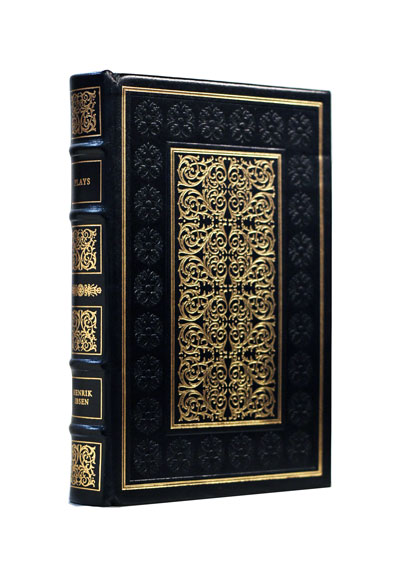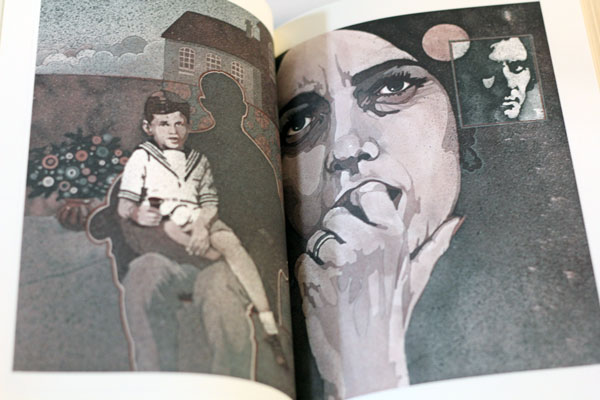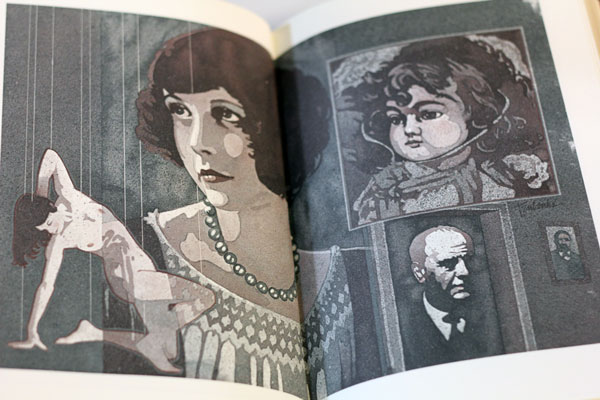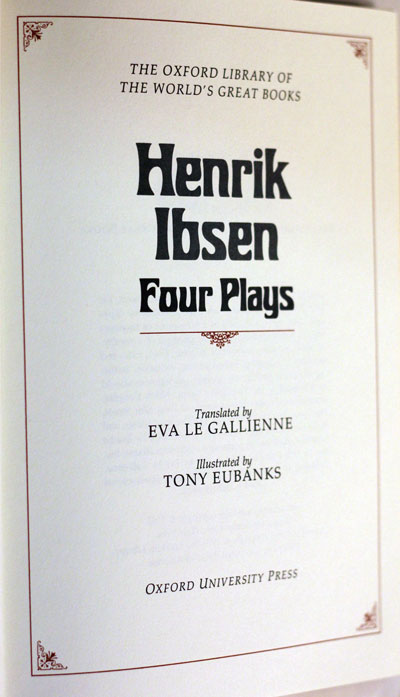About this edition:
This book is a triumph of book design and bookbinding, meant to last for generations. It features:
- Full top-grade leather binding
- Genuine 22k gold gilt to all edges, front design, spine, and back
- Marbled endsheets
- Satin bookmark, sewn-in
- Hubbed spine with raised bands
- Smyth-sewn binding for durability
- Premium acid-neutral archival paper that will not yellow
A writeup by a book collector at Librarything.com:
OXFORD UNIVERSITY PRESS AND FRANKLIN MINT: One Brief, Shining Moment
The Franklin Library, the publishing division of The Franklin Mint, was of course, at one time, the nation’s largest publisher of great books in fine bindings. Founded in 1973, it ceased publishing in 2000. Its early editions ~ fully bound in genuine premium-grade, hand-cut leather, selected for quality of grain and texture ~ were designed and bound by The Sloves Organization, Ltd., an affiliate of the mint, whose bindery was one of the few in the world devoted exclusively to the crafting of fine leather books.
Printed from 1981 to 1985,* the Oxford/Franklin volumes are gorgeous ~ absolutely stunning in their production qualities. Oxford University Press, in fact, specially chose the publishing division of The Franklin Mint to design and produce its World’s Great Books series because of Franklin’s unsurpassed skill in achieving a premium-quality product: each Oxford book must also be ‘a wonder’ in the finest of bookbinding traditions and, if possible, exceed Franklin’s high standard. By that prestigious election, Franklin thus was also doubly honored and formally recognized for the awesome reputation it had achieved in the publishing world throughout the decade of the 1970s.
It is because of that ‘brief, shining moment’ in publication history that these fine classic Oxford/Franklin editions generally surpass anything else ever produced either before or after that time by any of today’s renowned publishing giants. Relatively few titles in the multi-edition Great Books series were given the fabulous full-leather treatment; most were quarter-bound volumes ~ very lovely indeed by the lights of their own publication merits ~ but still unable to boast the same ‘Rolls Royce’ elegance of their full-leather counterparts.
About the author (from wikipedia):
Henrik Johan Ibsen (1828 – 1906) was a major 19th-century Norwegian playwright, theatre director, and poet. He is often referred to as “the father of realism” and is one of the founders of Modernism in theatre. His major works include Brand, Peer Gynt, An Enemy of the People, Emperor and Galilean, A Doll’s House, Hedda Gabler, Ghosts, The Wild Duck, Rosmersholm, and The Master Builder. He is the most frequently performed dramatist in the world after Shakespeare, and A Doll’s House became the world’s most performed play by the early 20th century.
Several of his later dramas were considered scandalous to many of his era, when European theatre was expected to model strict morals of family life and propriety. Ibsen’s later work examined the realities that lay behind many façades, revealing much that was disquieting to many contemporaries. It utilized a critical eye and free inquiry into the conditions of life and issues of morality. The poetic and cinematic early play Peer Gynt, however, has strong surreal elements.
Ibsen is often ranked as one of the truly great playwrights in the European tradition. Richard Hornby describes him as “a profound poetic dramatist—the best since Shakespeare”. He is widely regarded as the most important playwright since Shakespeare. He influenced other playwrights and novelists such as George Bernard Shaw, Oscar Wilde, Arthur Miller, James Joyce, Eugene O’Neill and Miroslav Krleža. Ibsen was nominated for the Nobel Prize in Literature in 1902, 1903 and 1904.
Ibsen wrote his plays in Danish (the common written language of Denmark and Norway) and they were published by the Danish publisher Gyldendal. Although most of his plays are set in Norway—often in places reminiscent of Skien, the port town where he grew up—Ibsen lived for 27 years in Italy and Germany, and rarely visited Norway during his most productive years. Born into a merchant family connected to the patriciate of Skien, his dramas were shaped by his family background. He was the father of Prime Minister Sigurd Ibsen. Ibsen’s dramas continue in their influence upon contemporary culture and film with notable film productions including A Doll’s House featuring Jane Fonda and A Master Builder featuring Wallace Shawn.





